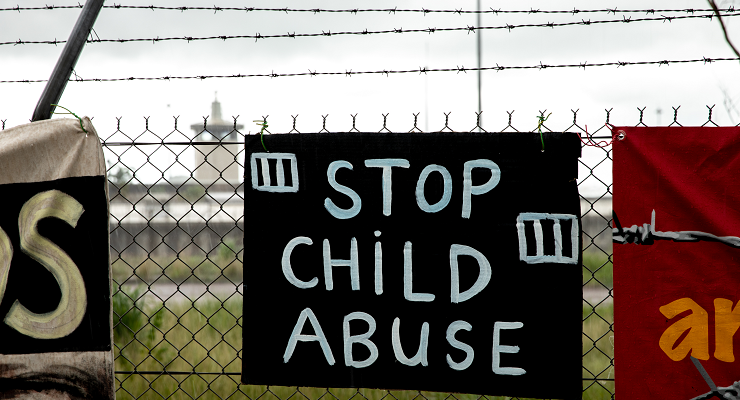
Amid a media cyclone last week concerning chronic violence and alcohol issues in Alice Springs, children in two detention centres almost 4000 kilometres apart were being held in solitary confinement. Most are on remand; most, if not all, are First Nations. The continued documentation of the horrors inside these centres begs the question: why isn’t there an outcry?
Donna Hunter’s 12-year-old grandson has spent four months during the past two years inside the former adult prison in Berrimah known as Don Dale Detention Centre, on the outskirts of Darwin. Hunter says he has spent long periods in solitary confinement and that his meals have been shoved through door hatches. She cites a lack of recreational activities and therapeutic care as longstanding issues.
“Just imagine what that does to their head. For two years now I’ve seen the difference in my grandson from what he is today … He’s there in that place that was condemned for a bulldozer, but it’s still standing,” she said.

“They put the children in there, our most vulnerable — our future. They put them in there: [a] three-by-three cell, a toilet, a tap that they drink out of and wash their hands, a basin. That’s what they do — cockroaches, ants on the walls, spit.”
Over in Western Australia, Banksia Hill Detention Centre gained national attention when teenage detainees, tired of months of confinement, climbed onto the prison’s roof on New Year’s Eve and set fire to a building. Located in Perth’s south, it is the only youth detention centre in the state, and is the subject of a class action alleging severe mistreatment by numerous former detainees.
Voices from those inside were published in a report by the WA children’s commissioner at the end of 2021. Anonymous detainees described their conditions: “We got no fresh air. We’ve got only little windows in our cells … they wonder why we get so angry when they keep us in our cell all day.”
Self-harm is prevalent, with one detainee saying, “The only time you get to see the nurse is when you threaten yourself.”
Banksia Hill and Don Dale are two sides of the same coin: staffing shortages, repeated usage of solitary confinement, children consistently incarcerated on remand for petty crime, and an overwhelmingly Aboriginal representation in the justice and detention systems.
A spate of youth crime brings attention (and money), but the aftermath is much direr: what is it about children being locked up in detention that is so acceptable to Australian society?
Both Western Australia and the Northern Territory share Labor governments that profess to be “tough on crime” and that have funnelled millions into either expanding or building anew their respective youth detention centres.
Noongar woman, lawyer and international human rights expert Dr Hannah McGlade sees the situations in Alice Springs, Darwin and Perth as saying governments and society at large were “more willing to respond” when there are “Aboriginal kids running amok on the streets”.
“I think when it comes to Aboriginal kids that are locked up, it is ‘out of sight, out of mind’, which is a racist attitude,” McGlade said.
For the NT government, a longstanding attempt to shift its image since the Royal Commission into the Protection and Detention of Children in the Northern Territory has still not culminated in the closure of the Don Dale centre, despite the commission’s final report explicitly calling for such action.
And in Western Australia, a Labor supermajority with billions poured into policing means that laws such as three-strike mandatory detention can pass without opposition.
“It’s been decades of this punitive approach — they think it’s a vote-catcher,” McGlade said.
For Donna Hunter, the lack of proper rehabilitation means that her grandson is one of many cycling through the system, again and again. It isn’t about politics for her; it is about bringing him home.








We send youth and others to jail, they stay there, learn little and come out the other side with little or no change in circumstance so how can we even suggest the process is fit for purpose.
Be serious! This has nothing to do with Labor’s huge majority in WA. Incarceration and maltreatment of Aboriginal people has been the standing bipartisan policy of the WA parties and the governments they form from the beginning. If the WA Liberals or Nationals tried to look as though they opposed the current government on this they could not possibly be taken seriously and the hypocrisy would be off the scale.
I heard Cathy McGowan say that her time as an MP made her realise that the dominant group (to which she and I belong) in Australia has a violent culture that drives parliamentarians to seek out inherently violent policy solutions.
I really wanted to push back against her claim, but when I stopped myself and thought about it, I realised that she was correct. It was a very confronting few minutes that I don’t expect to forget any time soon, especially when we have these regular reminders.
It’s good to see Hannah McGlade mentioned in this article. She has an effective way of communicating these things. I wonder what a conversation between Hannah and Cathy would sound like? Both great communicators and both with valuable insights to help us reflect critically on our actions and what drives them.
Very profound and unfortunately, very true. It is no coincidence – a bit like the US and their violence (both at home and internationally).
I would add racist to violent policy……
Incarceration is a popularly prescribed remedy because nobody imagines “what it does to their heads.” They don’t imagine the worldview of the child criminal. If they did, they might suspect that the child had not been cared for, loved, or taught the same things.
Incarceration is a popular prescription because it’s quick, easy, and requires no education, skill or thought to prescribe.
The only bad thing about incarceration is that it increases misery and crime instead of reducing it.
As well as that, on the positive side of incarceration are the splendid profits enjoyed by the corporations who run such facilities, which they generously remember to share with the political parties who make these opportunities available.
I remember the comments of a reformed crim I heard once: Society pays three times for my criminal activity – it pays when I committed the first crime, it pays a fortune to lock me up, and then it pays again when I come out even more hardened and vicious.
Articles like this highlight that we are not the society we claim to be. Like the issue of indefinite detention of refugees and asylum seekers, this jailing of children is a shameful blot on our society.
We know that jailing young people is counterproductive, and that there are better ways of turning their lives around, this preventing those petty crimes which so exercise those ‘Lock them up and throw away the key’ types.
Like the author I ask the question of why it is acceptable to us to destroy these children’s lives, because, make no mistake, that is what we are doing.
May The Voice be warmly welcomed by Australians later this year. It might just be the way to bring these issues to the forefront and prompt government action.